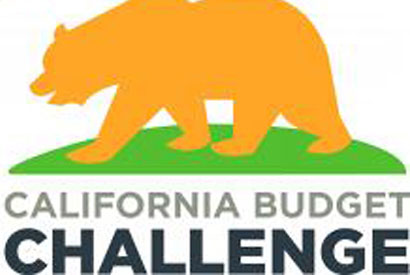Students step up to budget challenge
Clickers in hand, a civic-minded student audience weighs some tough choices on cuts and spending.
March 21, 2012
If UC Berkeley students ran the California Legislature, could they manage to make the tough choices needed to whittle away the state’s massive, recurring budget deficits?
 That, in a nutshell, was the exercise Tuesday night at ASUC headquarters in Eshleman Hall, where Nancy Skinner, Berkeley’s representative in the Assembly, led a studious, civic-minded crowd of 150 or so — a bit more than the 120 legislators in the state Assembly and Senate combined — through a series of possible spending cuts and tax hikes of the kind she and her Sacramento colleagues grapple with on a regular basis.
That, in a nutshell, was the exercise Tuesday night at ASUC headquarters in Eshleman Hall, where Nancy Skinner, Berkeley’s representative in the Assembly, led a studious, civic-minded crowd of 150 or so — a bit more than the 120 legislators in the state Assembly and Senate combined — through a series of possible spending cuts and tax hikes of the kind she and her Sacramento colleagues grapple with on a regular basis.
In January, Gov. Jerry Brown released a 2012-13 budget proposal aimed at closing a $9.2 billion shortfall — and avoiding $5 billion in so-called trigger cuts that could mean yet another $200 million hit to the UC system. The proposal includes roughly $4 billion in cuts to health programs, social services and education, and projects nearly $7 billion in new revenues. California voters will vote on the revenue portions in November.
Skinner — a Berkeley alum and a Democrat who noted her party is two votes shy of the two-thirds supermajority needed, under Proposition 13, to approve revenue measures in the Assembly — offered an informal primer on how the deficit grew, from former Gov. Arnold Schwarzenegger’s elimination of the vehicle license fee to current corporate tax rates she said are lower than those in place when Ronald Reagan ruled Sacramento. She made a point of thanking students for their activism on budget matters, adding that many of her Assembly colleagues are appreciative of their efforts to rally public support for higher education.
With help from Sarah Henry, program director for the San Francisco-based nonprofit Next 10, Skinner then led the audience — provided with wireless clickers — through Next 10’s “California Budget Challenge,” a series of votes on cutting and spending options on issues ranging from K-12 through health services and criminal justice and, of course, higher ed. With each vote, the new deficit tally was duly recorded on a blackboard at the front of the room, reflecting student voters’ willingness to face up to the tensions between funding the services they want and, as state law requires, raising enough money to pay for it all.
In contrast to the heavily Democratic state Legislature, just 53 percent of the student voters said they were Democrats. They nonetheless mustered the needed two-thirds support for adding $6 billion to the state treasury by boosting tax rates on those earning above $1 million a year, as called for by the Millionaires Tax initiative proposed for November’s ballot, and for increasing the corporate tax rate to its previous peak of 9.6 percent, estimated to be worth another $800 million.
The governor’s own proposal to raise sales taxes by .5 percent for four years garnered meager support from the crowd, which voted neither to raise existing rates nor expand the sales-tax base to include some legal, entertainment and personal services. The most strenuous disapproval of the evening — expressed via boos as well as by ballots — came in response to a suggested 5-cent surcharge on alcoholic drinks, a budget boost valued at $600 million. But an alternative proposal for new taxes on oil severance, cigarettes and alcohol — which would raise $3 billion for the state — won overwhelming approval.
In the end, the group not only balanced the budget, but had $100 million to spare.
Many, no doubt, had already earmarked the surplus for higher ed.